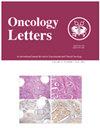Roles of DEPDC1 in various types of cancer (Review).
IF 2.2
4区 医学
Q3 ONCOLOGY
引用次数: 0
Abstract
Dishevelled, EGL-10 and pleckstrin domain-containing 1 (DEPDC1) has been identified as a crucial factor in the development and progression of various types of cancer. This protein, which is largely undetectable in normal tissues but is highly expressed in numerous tumor types, serves a significant role in cell mitosis, proliferation, migration, invasion, angiogenesis, autophagy and apoptosis. Furthermore, DEPDC1 is implicated in several key signaling pathways, such as NF-κB, PI3K/Akt, Wnt/β-catenin and Hippo pathways, which are essential for cell proliferation and survival. The expression of DEPDC1 has been linked to poor prognosis and survival rates in multiple types of cancer, including hepatocellular carcinoma, lung adenocarcinoma, colorectal cancer and breast cancer. Notably, DEPDC1 has been suggested to have potential as a diagnostic and prognostic marker, as well as a therapeutic target. Its involvement in critical signaling pathways suggests that targeting DEPDC1 could inhibit tumor growth and metastasis, thereby improving patient outcomes. In addition, clinical trials have shown promising results for DEPDC1-derived peptide vaccines, indicating their safety and potential efficacy in cancer treatment. To the best of our knowledge, this is the first comprehensive review addressing the role of DEPDC1 in cancer. Through a critical analysis of existing studies, the present review aimed to consolidate existing knowledge and highlight gaps in understanding, paving the way for future research to elucidate the complex interactions of DEPDC1 in the context of cancer biology.DEPDC1 在各类癌症中的作用(综述)。
Dishevelled、EGL-10 和 pleckstrin domain-containing 1 (DEPDC1) 已被确定为各种癌症发生和发展的关键因素。这种蛋白质在正常组织中基本检测不到,但在许多肿瘤类型中高度表达,在细胞有丝分裂、增殖、迁移、侵袭、血管生成、自噬和凋亡中发挥着重要作用。此外,DEPDC1 还与几种关键信号通路有关,如 NF-κB、PI3K/Akt、Wnt/β-catenin 和 Hippo 通路,这些通路对细胞增殖和存活至关重要。DEPDC1 的表达与多种癌症的不良预后和生存率有关,包括肝细胞癌、肺腺癌、结直肠癌和乳腺癌。值得注意的是,DEPDC1 被认为具有诊断和预后标志物以及治疗靶点的潜力。DEPDC1 参与关键信号通路,这表明靶向 DEPDC1 可抑制肿瘤生长和转移,从而改善患者预后。此外,DEPDC1 衍生多肽疫苗的临床试验也显示出良好的效果,表明其在癌症治疗中的安全性和潜在疗效。据我们所知,这是第一篇全面探讨 DEPDC1 在癌症中作用的综述。通过对现有研究的批判性分析,本综述旨在整合现有知识并强调认识上的差距,为未来研究阐明 DEPDC1 在癌症生物学中的复杂相互作用铺平道路。
本文章由计算机程序翻译,如有差异,请以英文原文为准。
求助全文
约1分钟内获得全文
求助全文
来源期刊

Oncology Letters
ONCOLOGY-
CiteScore
5.70
自引率
0.00%
发文量
412
审稿时长
2.0 months
期刊介绍:
Oncology Letters is a monthly, peer-reviewed journal, available in print and online, that focuses on all aspects of clinical oncology, as well as in vitro and in vivo experimental model systems relevant to the mechanisms of disease.
The principal aim of Oncology Letters is to provide the prompt publication of original studies of high quality that pertain to clinical oncology, chemotherapy, oncogenes, carcinogenesis, metastasis, epidemiology and viral oncology in the form of original research, reviews and case reports.
 求助内容:
求助内容: 应助结果提醒方式:
应助结果提醒方式:


